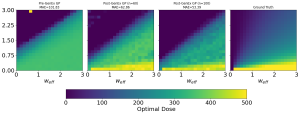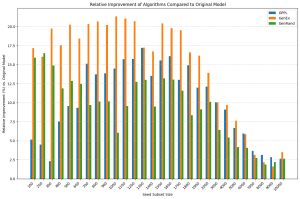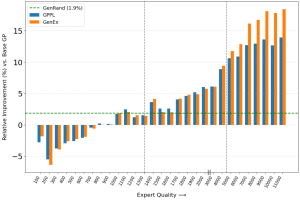Yes, GenEx is a riff on:
Generation X, often shortened to Gen X, generally refers to the demographic cohort born between 1965 and 1980. This definition is widely accepted by researchers, demographers, and sources such as Pew Research Center, U.S. Census data, Britannica, and various think tanks. This generation is noted for being independent, resourceful, and tech-savvy, as they were the first to grow up with personal computers and cable TV, including MTV. They experienced important historic events like the rise of the internet boom.
As you know (The Unbelievable Luckiness of Being and The Man Who Loves Zeroes), I was born in 1965 – my co-authors Satyam Verma, Holly Wiberg and Woody Zhu were born decades later, and so I thank them for playing along! – and so choosing GenEx as the acronym of our framework in our new paper is particularly satisfying:
Data to Dose: Efficient Synthetic Data Generation with Expert Guidance for Personalized Dosage.
Here is the abstract:
Personalized treatment optimization is often constrained by data scarcity, especially in settings involving heterogeneous or rare patient profiles. Standard data-driven approaches struggle in these low-data regimes, limiting their ability to provide individualized and safe dosing recommendations. We introduce GenEx, a hybrid framework that integrates preference-based Bayesian optimization with a generative model that is fine-tuned using expert feedback. Expert-provided pairwise rankings guide updates to both a surrogate model and a generative component, which proposes synthetic data points in uncertain regions when the generator is consistent with expert preferences. Theoretical analysis establishes performance guarantees through sublinear regret bounds while controlling for bias introduced by synthetic augmentation. Numerical experiments simulating personalized chemotherapy dosing show that GenEx achieves faster convergence and improved decision quality compared to preference-only and purely generative baselines, even with a smaller starting dataset. Combining expert feedback with generative modeling can significantly improve personalized decision-making in healthcare and other high-stakes, data limited contexts. This approach allows managers and clinicians to design more effective and safer individualized treatment plans while reducing the need for extensive historical data, and it offers a scalable strategy to efficiently integrate expert knowledge in practice.
A flowchart depicting GenEx is the image at the top of this post. There are four key components.
-
Bayesian Surrogate (Gaussian Process, GP):
-
Models the latent goal function that balances efficacy and toxicity for a given patient–dose pair.
-
Uses Thompson sampling to propose candidate doses.
-
Updated not with numeric labels, but with pairwise expert preferences (e.g., “dose A is safer/more effective than dose B”).
-
-
Expert Feedback:
-
Experts provide lightweight comparative judgments, which are easier than providing exact labels.
-
These rankings update the GP’s posterior distribution.
-
-
Conditional Generator (cVAE):
-
Produces synthetic patient–dose–response triplets.
-
Generation occurs only when the model’s rankings align with expert preferences (a trust gate).
-
If misaligned, the generator is fine-tuned to reduce disagreement before resuming augmentation.
-
-
Iterative Actor–Critic Loop:
-
(i) GP proposes doses.
-
(ii) Expert ranks them.
-
(iii) Generator is refined if misaligned.
-
(iv) Once aligned, synthetic data from uncertain regions is injected back into the GP training set.
-
GenEx offers the following advantages:
-
Sample efficiency: Relies on pairwise preferences, reducing annotation burden.
-
Safety: Uncertainty estimates guide exploration conservatively.
-
Modularity: Surrogate or generator models can be swapped without losing theoretical guarantees.
-
Offline compatibility: Operates in batch mode, fitting into clinical workflows.
A core novelty is viewing the surrogate not as a passive predictor, but as a co-designed agent that evolves in tandem with expert input and synthetic augmentation.
Visually, the next heatmap shows how GenEx improves the fidelity of the personalized dosage. The right hand most picture is the ground truth (obtained with more than 10000 data points). The left hand most picture is straight forward Inverse Optimization results (with 700 data points). As you can see, by judiciously generating data points and querying experts, with just 60 and 100 additional data points, we begin to approach the ground truth:

What if we just generated data (GenRand) and did not use expert feedback? What if we used expert feedback but did not generate any data (GPPL)? As you can see, GenEx outperforms these benchmarks:

What is the expert quality is not high? Of course, below a certain quality level, it is best not to engage them! But, as their quality improves, you can see how GenEx improves over GPPL, indicating that generating additional data points in uncertainty-aware regions and incorporating expert preferences, has increasing returns. That is, expert quality and data generation are complements here:

We believe GenEx represents a new paradigm in human-AI collaboration for decision-making under data scarcity. Rather than relying solely on labeled outcomes or static rules, it integrates human preferences with synthetic exploration, ensuring both interpretability and efficiency. By actively shaping its own learning process, GenEx bridges the gap between traditional heuristic clinical judgment and modern machine learning. GenEx does not replace clinicians, but scaffolds expert judgment, extracting maximum value from limited interactions and extending insights into underexplored patient profiles. In doing so, it exemplifies a shift toward adaptive, modular, and collaborative optimization systems that can transform precision medicine and other fields constrained by scarce data. We look forward to engaging further with our collaborators in making personalized medicine a reality.
Indeed as GenEx is not limited to healthcare applications, we look forward to identifying other applications where personalized decisions can make a huge difference. We – especially Holly and I – are hoping to interest F1 AI types (see F1 Edition and Fun, Fun, Fun) to consider working with us!






